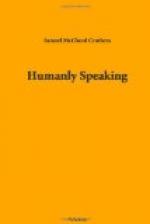“We think our fathers fools, so
wise we grow:
Our wiser sons, perhaps, will think us
so.”
He need not have put in the “perhaps.”
The nineteenth century had its fling at the artificiality of the eighteenth century, and treated it with contempt as the age of doctrinaires. And now that the twentieth century is coming to the age of discretion, we hear a new term of reproach, Mid-Victorian. It expresses the sum of all villainies in taste. For some fifty years in the nineteenth century the English-speaking race, as it now appears, was under the sway of Mrs. Grundy. It was living in a state of most reprehensible respectability, and Art was tied to the apron-strings of Morality. Everybody admired what ought not to be admired. We are only now beginning to pass judgment on the manifold mediocrity of this era.
All this must, for the time, count against Dickens; for of all the Victorians he was the midmost. He flourished in that most absurd period of time—the time just before most of us were born. And how he did flourish! Grave lord chancellors confessed to weeping over Little Nell. A Mid-Victorian bishop relates that after administering consolation to a man in his last illness he heard him saying, “At any rate, a new ‘Pickwick Paper’ will be out in ten days.”
Everywhere there was a wave of hysterical appreciation. Describing his reading in Glasgow, Dickens writes: “Such pouring of hundreds into a place already full to the throat, such indescribable confusion, such rending and tearing of dresses, and yet such a scene of good humor, I never saw the slightest approach to.... Fifty frantic men got up in all parts of the hall and addressed me all at once. Other frantic men made speeches to the wall. The whole B family were borne on the top of a wave and landed with their faces against the front of the platform. I read with the platform crammed with people. I got them to lie down upon it, and it was like some impossible tableau, or gigantic picnic,—one pretty girl lying on her side all night, holding on to the legs of my table.”
In New York eager seekers after fiction would “lie down on the pavement the whole of the night before the tickets were sold, generally taking up their position about ten.” There would be free fights, and the police would be called to quell the riot.
Such astonishing actions on the part of people who were unfortunate enough to live in the middle of the nineteenth century put us on our guard. It could not have been a serious interest in English literature that evoked the mob spirit. Dickens must have been writing the kind of books which these people liked to hear read. We remember with some misgivings that in the days of our youth we wept over Little Nell, just as the lord chancellor did. The question which disturbs us is, Ought we to have done so?
Let us by a soft answer turn away the wrath of the critic. Doubtless we ought not to have done so. Our excuse is that, at the time, we could not help it. We may make the further plea, common to all soft-hearted sinners, that if we hadn’t wept, other people would, so that no great harm was done, after all.




